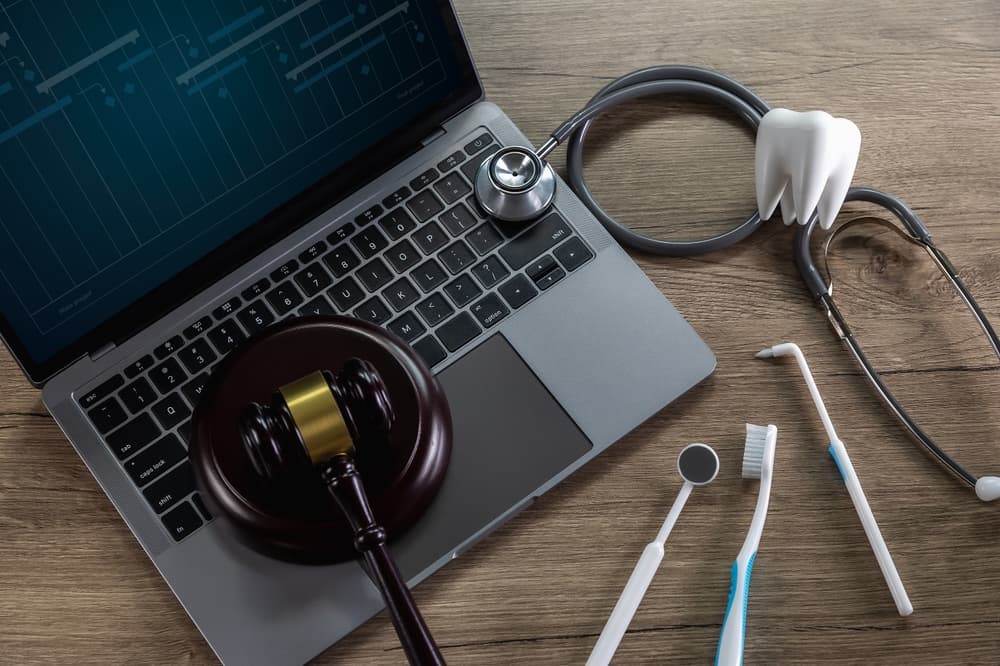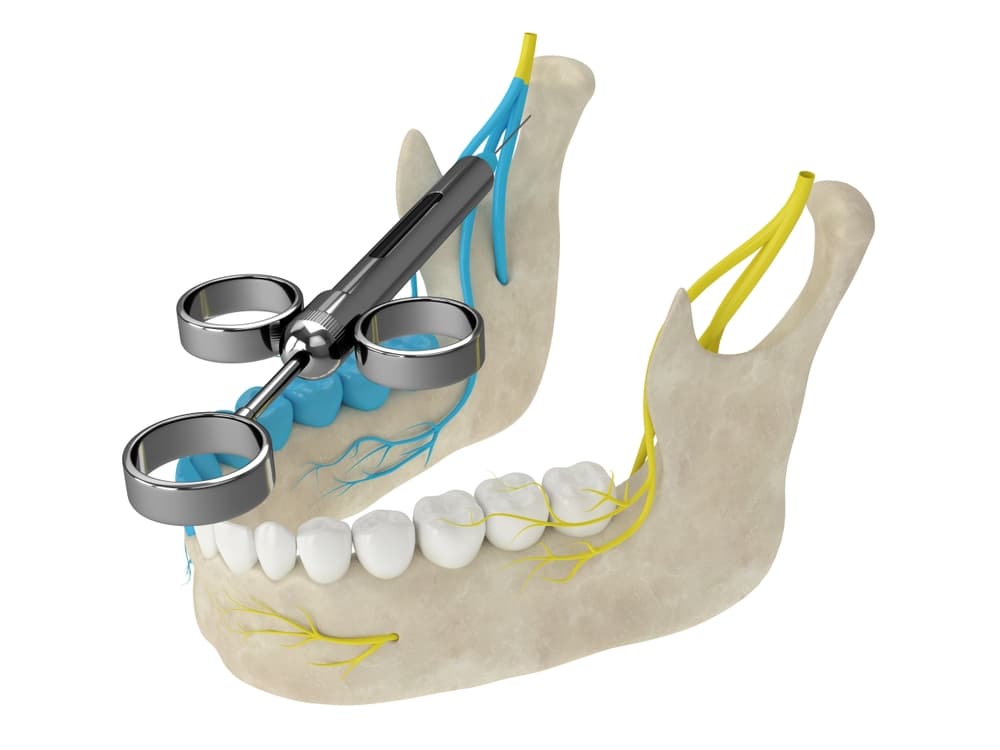When dentists perform procedures incorrectly and make other serious mistakes, nerve damage, and other medical complications may result. If you suspect dental malpractice, you need to consult an experienced San Mateo dental malpractice lawyer right away. An attorney can investigate your circumstances and determine whether malpractice likely occurred. They can then file a claim or a lawsuit on your behalf and seek financial recovery for your injuries and losses.
How Can Dental Malpractice Lead to Nerve Damage?

Dental malpractice occurs when a dentist or dental professional fails to provide the standard of care expected in the industry, resulting in harm or injury to the patient. One potential consequence of dental malpractice is nerve damage, which can have serious and long-lasting effects on a patient’s oral health and overall well-being.
Dental malpractice can lead to nerve damage in several ways:
- Nerve Injury During Dental Procedures – Certain dental procedures, such as tooth extractions, root canals, and dental implant placement, carry a risk of nerve injury if not performed properly. For example, if a dentist applies excessive force or uses improper techniques during a tooth extraction, it can damage the nerves surrounding the tooth, leading to numbness, tingling, or pain in the affected area.
- Anesthesia Errors – Administering local anesthesia is a common practice in dentistry to numb the area being treated and minimize pain during procedures. However, if anesthesia is not administered correctly or if the dosage is too high, it can result in nerve damage. Nerve injuries that result from anesthesia errors may be temporary or permanent, depending upon the severity of the damage.
- Failure to Identify Nerve Pathways – Before performing certain dental procedures, such as dental implant placement or root canal therapy, dentists must carefully assess the patient’s oral anatomy, including the location of nerves in the area. Failure to accurately identify nerve pathways can increase the risk of inadvertently damaging nerves during the procedure, leading to nerve injury and associated complications.
- Postoperative Complications – After dental procedures, patients may experience postoperative complications, such as infection or inflammation, which can put pressure on nearby nerves and cause damage. If not promptly diagnosed and treated, these complications can exacerbate nerve damage and prolong the patient’s recovery time.
- Lack of Informed Consent – Patients have the right to receive comprehensive information about the risks and potential complications associated with dental procedures before consenting to the treatment. If a dentist fails to adequately inform the patient about the risk of nerve damage associated with a particular procedure, it may constitute dental malpractice – especially if the patient experiences nerve injury as a result.
Overall, dental malpractice can have serious consequences, including nerve damage, for patients undergoing dental procedures. Dentists have a duty to provide competent and attentive care to their patients and to take appropriate measures to minimize the risk of nerve injury during dental procedures.
If a patient experiences nerve damage due to dental malpractice, they may be entitled to compensation for their injuries and associated damages through a dental malpractice claim or lawsuit. Seeking prompt legal advice from an experienced dental malpractice attorney can help victims understand their rights and pursue the compensation they deserve.
Legal Elements of a Dental Malpractice Claim Involving Nerve Damage

Proving a dental malpractice claim for nerve damage involves establishing several legal elements to demonstrate that the dentist or dental professional breached the standard of care, resulting in harm or injury to the patient. Here are the key legal elements of a dental malpractice claim for nerve damage:
- Duty of Care – The first element to establish in a dental malpractice claim is that the dentist owed a legal duty of care to the patient. This duty of care requires dentists to provide competent and attentive treatment in accordance with accepted standards of dental practice.
- Breach of Duty – The next step is to show that the dentist breached the legal duty of care by failing to meet the standard of care expected in the industry. This may involve demonstrating that the dentist deviated from accepted dental practices or failed to take appropriate precautions to prevent nerve damage during a dental procedure.
- Causation – After establishing a breach of legal duty, the patient must prove that the dentist’s negligence was the direct cause of the nerve damage that the patient suffered. This requires demonstrating a causal link between the dentist’s actions or omissions and the resulting harm, such as nerve injury sustained during a dental procedure.
- Injuries and Damages – The patient must also establish that they suffered injuries and damages as a direct result of the dentist’s negligence. In the case of nerve damage, this may include physical pain, numbness, tingling, or loss of sensation in the affected area, as well as emotional distress, lost quality of life, and financial expenses associated with dental treatment and rehabilitation.
By gathering and presenting compelling evidence to support each of these legal elements, injured patients can strengthen their dental malpractice claim and improve their chances of obtaining compensation for their nerve damage and associated losses.
Evidence to Support a Dental Malpractice Claim Involving Nerve Damage

In a dental malpractice claim involving nerve damage, gathering strong evidence is crucial to support the claim and establish that the dentist’s negligence caused harm to the patient. Here are several types of evidence that can be used to support a dental malpractice claim involving nerve damage:
- Medical Records – Medical records from the dental visit are essential evidence in a dental malpractice claim. These records document the details of the dental procedure, including the type of treatment performed, any complications that the dentist noted, and the patient’s medical history. Reviewing the medical records can help identify any errors or deviations from the standard of care that may have led to nerve damage.
- Diagnostic Tests and Imaging Studies – Diagnostic tests and imaging studies, such as X-rays, CT scans, or MRI scans, can provide objective evidence of nerve damage. These tests may reveal abnormalities in the affected area, such as nerve compression, inflammation, or structural damage, supporting the patient’s claim of nerve injury resulting from the dental procedure.
- Nerve Conduction Studies – Nerve conduction studies are specialized tests used to evaluate the function of the nerves and identify areas of nerve damage. These tests measure the speed and strength of electrical signals traveling along the nerves, helping to confirm the presence and extent of nerve damage resulting from the dental procedure.
- Expert Testimony – Expert testimony from qualified dental professionals can provide valuable insight into the standard of care expected in similar circumstances and whether the dentist’s actions or omissions constituted negligence. Dental experts can review the patient’s medical records, diagnostic tests, and imaging studies to assess the cause and extent of the nerve damage and provide an opinion on whether it resulted from the dentist’s negligence.
- Patient Testimony – The patient’s own testimony describing their symptoms, experiences, and the effect of the nerve damage on their daily life can be compelling evidence in a dental malpractice claim. Patients can provide detailed accounts of any pain, numbness, tingling, or loss of sensation they have experienced since the dental procedure, as well as any limitations or difficulties they face as a result of the nerve damage.
- Documentation of Treatment and Expenses – Documentation of medical treatment received for the nerve damage, including medications, therapy, and surgical interventions, as well as associated expenses like medical bills and lost income, can support the patient’s claim for compensation.
By gathering and presenting strong evidence to support the dental malpractice claim involving nerve damage, patients can improve their chances of obtaining fair compensation for their injuries and hold the negligent dentist accountable for their actions. An experienced dental malpractice attorney can provide valuable assistance in gathering and presenting the necessary evidence to support the claim and pursue justice.
Recovering Compensation in a Dental Malpractice Claim Involving Nerve Damage
In a dental malpractice claim involving nerve damage, individuals may be eligible to receive compensation to address the injuries and damages they have suffered as a result of the dentist’s negligence. Here are the types of compensation that may be recoverable in a dental malpractice claim involving nerve damage:
- Related Medical Expenses – The bulk of compensation in a dental malpractice claim is reimbursement for medical expenses related to nerve damage. This may include costs for diagnostic tests, imaging studies, nerve conduction studies, medical consultations, medications, surgeries, rehabilitation, and other necessary medical treatments to address the nerve injury and its effects.
- Lost Income – If the nerve damage prevents the individual from working or performing their usual job duties, they may be entitled to recover compensation for lost income or wages. This can include both past lost earnings and future lost earning capacity if the nerve damage results in a long-term or permanent disability that affects the individual’s ability to earn a living.
- Pain and Suffering – Compensation should also cover the physical pain, discomfort, and emotional suffering endured as a result of the nerve damage. Nerve injuries can cause significant pain, numbness, tingling, and other symptoms that may affect the individual’s quality of life and ability to perform daily activities. Compensation for pain and suffering aims to provide financial relief for the physical and emotional toll of the dental injury.
- Loss of Enjoyment of Life – Nerve damage can also have a profound effect on an individual’s ability to enjoy life and engage in activities, hobbies, recreational pursuits, and social events they once enjoyed.
- Future Medical Expenses – In cases where the nerve damage requires ongoing medical care and treatment, compensation may be available to cover the anticipated costs of future medical expenses. This can include expenses for long-term monitoring, follow-up appointments, medications, therapy, and other medical interventions needed to manage the effects of the nerve injury and promote recovery.
- Punitive Damages – In cases of egregious misconduct or recklessness on the part of the dentist, punitive damages may be available to punish them and deter similar misconduct in the future.
By seeking compensation for these types of damages in a dental malpractice claim involving nerve damage, individuals can obtain the financial resources they need to cope with all of their physical, emotional, and financial losses.
How to Litigate a Dental Malpractice Case
Successfully litigating a dental malpractice case involves several steps, each aimed at resolving the dispute and obtaining compensation for the injured individual. Here’s an overview of the typical steps involved in litigating a dental malpractice claim:
- Prompt Consultation with an Attorney – The process begins with the injured individual consulting an experienced dental malpractice attorney. During the consultation, the attorney will review the details of the case, assess the strength of the claim, and provide guidance on the legal options available.
- Filing a Lawsuit – If the attorney determines that the case has merit, they will file a lawsuit on behalf of the injured individual against the dentist or dental professional alleged to be responsible for the malpractice. The lawsuit initiates the legal process and formally notifies the at-fault party (or defendant) of the allegations against them.
- Discovery – During the discovery phase, both parties exchange information and evidence relevant to the case. This may include requests for documents, interrogatories (written questions), and depositions (sworn testimony given under oath). Discovery allows each party to gather evidence, assess the strengths and weaknesses of their case, and prepare for trial.
- Negotiation and Settlement – Throughout the litigation process, the parties may engage in settlement negotiations to resolve the case without going to trial. Negotiations may occur informally between the parties or through formal mediation or arbitration sessions that a neutral third party facilitates. If a settlement is reached, the parties will enter into a written agreement outlining the complete settlement terms.
- Trial or Alternative Dispute Resolution (ADR) – If settlement negotiations are unsuccessful, the case may proceed to trial. During a trial, both parties present evidence, call witnesses, and make legal arguments in front of a judge or jury. The judge or jury will then render a verdict based on the evidence presented and the applicable law.
Litigating a dental malpractice claim can be complex and time-consuming, but with the guidance of an experienced attorney, injured individuals can navigate the legal process and seek fair compensation for their injuries and damages. By understanding the steps involved in litigating a dental malpractice claim, individuals can make informed decisions about how best to proceed with their case and work towards achieving a favorable outcome.
Speak with a Dental Malpractice Attorney Today

If you suffer from nerve damage because of dental malpractice, you need to talk with a knowledgeable dental malpractice attorney in your area as quickly as possible. Your personal injury attorney can go over your potential legal options with you, file a claim or lawsuit on your behalf, and pursue a favorable resolution in your case.


